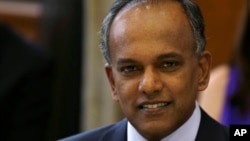Singapore’s Foreign Minister, K. Shanmugam, has warned that in light of last week’s congressional setback in granting presidential Trade Promotion Authority (TPA), the United States faces a “stark choice” over its future in the Asia-Pacific region. TPA approval is seen as crucial to eventual agreement on a new Asia free-trade accord. The Singaporean diplomat’s warning comes as Republican leaders in the House of Representatives move to delay another vote on TPA to late July.
Speaking Monday to the Washington-based Centers for Strategic and International Studies, the Shanmugam said it is vital to complete the years-long negotiations on the Trans-Pacific Partnership (TPP) free-trade agreement. Shanmugam said most of this century’s economic growth will come from Asia.
"Everyone knows China. But there are other parts of the story, India, Southeast Asia. ASEAN (Association of Southeast Asian Nations), the 10 countries of ASEAN together are the seventh largest economy in the world, something that not a lot of people realize – 2.4 trillion dollars today but, within five years, it will be 4 trillion [dollars]," said Shanmugam.
Infrastructure
He said it is a region in need of infrastructure development, and that fields in which the United States is dominant, such as energy and information technology (IT), are much in demand. He added that it is a region where history is being rewritten with emerging new institutions, both national and multi-national.
"In all of this, where is the United States? It’s been the guarantor of peace; it’s been the guarantor of progress and prosperity up to now. If you don’t do this deal, what are your levers of power? How integrated are you into the Asian economies? Meanwhile, there are a whole series of other trade deals that have happened, will happen and from which you’ll be excluded," said Shanmugam.
He said the United States faces a stark choice: does it want to be part of the region, or does it want to be out of the region? He said that if Washington chooses to be out of a region that represents 40 percent of global gross domestic product, its only lever of power is the Seventh Fleet, the U.S. naval presence in the region.
"Trade is strategy, and you’re either in or you’re out, and what does it mean for your jobs, your investments, for your prosperity? I mean it’s very, very serious, and your credibility. Let’s be frank about it; the president wants it (TPA), everybody knows this is important and you can’t get it through?" he said.
World can not wait
The Singaporean diplomat said new chapters in Asia-Pacific are being written every day and the world will not wait, even for the United States.
Singapore analyst Michael Barr of Australia’s Flinders University School of International Studies, said the perception of political gridlock and rising economic nationalism in Washington concerns America’s traditional Asian allies. He said they would be reluctant to reach agreement on TPP without fast-track authority because it means Congress could further amend the pact.
"Singaporeans in particular, it’s not just them, are very concerned with managing the rise of China, and Singapore knows that they have extremely limited capacity to do anything themselves about managing the rise of China. All they can do is manage their response to it, and they really look to the Americans," said Barr.
Barr said they are concerned about losing faith in America. He said the real worry in Asia is the Americans will show themselves incapable of doing anything effective, even something minimal like signing a free trade agreement.
Republicans need more time
U.S. House Republican leaders have indicated they need more time to build congressional support for Trade Promotion Authority, which is tied to job retraining funding, referred to as Trade Adjustment Assistance (TAA), which was soundly defeated Friday. A move is underway to push the TPA vote back from Tuesday to July 30.
White House spokesman Josh Earnest acknowledged Monday the longer the process plays out, the harder it will be to build bipartisan support.
"So, the fact is, you know, we believe that we have some momentum. Just in the last several weeks, we’ve seen both TPA and TAA pass with bipartisan support in the Senate. We saw the Senate do something that many people thought was not possible, which is to build on that momentum to complete what the president believes is necessary to negotiating an agreement that clearly is in the best interests of the economy and the best interests of American middle class workers," said Earnest.
Complicating Obama’s efforts to gain fast-track authority is opposition from two key Democratic allies, House Minority Leader Nancy Pelosi and likely Democratic 2016 presidential nominee Hillary Clinton, who Sunday called on the president to listen to and work with his congressional allies.
Writing in Monday’s USA Today newspaper, Pelosi called for a new paradigm on global trade that gives voice to representatives of the public, as well as private and non-profit organizations. She said workers need more leverage, as well as greater transparency and accountability in trade pacts to protect wages, the planet and security.
